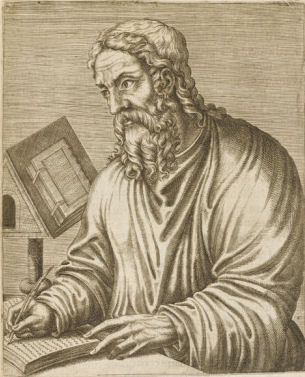
The letter written by Sidonius Appolinaris to his brother-in-law Agricola represents an enthusiastic panegyric to the Visigoth king Theodoric II. The real meaning of this document remains unclear without careful analysis of its contents on the one hand and without additional information about its author, its addressee and the conditions of its creation on the other. Exaggerated enthusiasm of Sidonius, obviously, requires logical explanation.
What are we finding out about Theodoric II from this passionate missive? First of all, this barbarian king happily gifted by “Providence and Nature” is famous for his “gentle breeding” and his way of life is praiseworthy. According to Sidonius, Theodoric’s head and face perfectly correspond to classical Roman standards of masculine attractiveness (finely aquiline nose, thin lips). Strangely, nothing is said about the Gothic king’s eyes and their look as if the author describes some sculpture. This omission is compensated by touching details about the length of Theodoric’s eyelashes and fresh color of his chin and neck which “often flush from modesty and not from anger”. In spite of the fact that the king’s hair cut and shaving style somewhat differ from Roman fashion he nevertheless regularly takes care of his look – hair in his nostrils is cut and the lower part of his face is shaven. Sidonius describes Theodoric’s well-built vigorous body and muscular limbs with somewhat exaggerated admiration and I would even say with love. But he knows better the tastes of his potential readers and how to seduce them.
Sidonius informs us that Theodoric starts his day with “the service of his priests” but forgets to precise that by “priests” are meant some heathen pontiffs or shamans because the king is not a Christian yet. As an excuse to the paganism of his outstanding barbarian the author mentions his lack of piety. After extolling Theodoric’s wisdom at the reception of “foreign envoys” Sidonius dwells on his strength and manhood (he tightens in person the string of his arc) as well as on his skill in archery. At dinner where conversation is more important than meals the author is enchanted by spotless silver, well selected draperies, moderation in drinking, attentive service and discipline. As the highest praise Sidonius finds at Theodoric’s table “elegance of Greece, good cheer of Gaul and Italian nimbleness”. Even when playing “the board-game” the Gothic king demonstrates attention, good humor, patience, persistence and “good fellowship”. According to Sidonius this gentle barbarian “is afraid of being feared” by his partners. Theodoric is so simple and good natured that to obtain favors from him it is sufficient to be beaten by him in game. The king’s evening is wisely devoted to “the burden of government” and finishes with quiet, virtuous supper devoid of noisy distractions.
What an idyllic picture! What a wonderful barbarian ruler without a single physical flaw featuring an impeccable way of life! Obviously, this description of handsome, strong, manly, wise, good-natured, gentle, well-bred and civilized Theodoric II is too good to be true. Every serious historian should ask himself why Sidonius exalts to the sky this Gothic king, what is his goal? To whom the author tries to sell his favorite?
Everything becomes clear when we read in the introduction that Sidonius’s father-in-law Avitus was Roman emperor at the time when this letter was written and what is more important that he came to power thanks to support of Theodoric II. In such a way, the missive addressed to the Emperor’s son Agricola was intended for circulation among Roman elite in order to convince them that Avitus chose a perfect trustworthy ally. Eulogizing Theodoric, Sidonius takes care to refute all negative features usually attributed by Romans to uncivilized barbarian rulers. Indeed, the author did his best to justify and promote Avitus’s pro-Visigoth policy.
Bibliography:
1- Paul, Halsall, ed., The Internet Medieval Sourcebook,